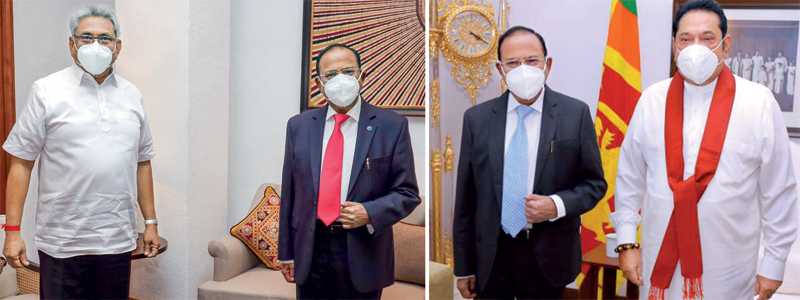Monday Feb 16, 2026
Monday Feb 16, 2026
Wednesday, 2 December 2020 00:00 - - {{hitsCtrl.values.hits}}

 The two-day visit of India’s National Security Adviser (NSA) Ajit Doval to Sri Lanka on 27 and 28 November was successful from the point of view of both the countries. While the Media Division of President Gotabaya Rajapaksa said that he had had a ‘highly fruitful’ discussion with the Indian NSA, an Indian diplomat described the visit as having been ‘very successful’.
The two-day visit of India’s National Security Adviser (NSA) Ajit Doval to Sri Lanka on 27 and 28 November was successful from the point of view of both the countries. While the Media Division of President Gotabaya Rajapaksa said that he had had a ‘highly fruitful’ discussion with the Indian NSA, an Indian diplomat described the visit as having been ‘very successful’.
There was consensus on economic and strategic cooperation, with each side taking into account the needs and sensitivities of the other. Both sides expressed keenness to expedite pending India-supported non-donor projects, which had been languishing for various reasons. Doval readily agreed to President Gotabaya’s suggestion to bring investment from India and to Prime Minister Mahinda Rajapaksa’s suggestion that India should build houses in South Lanka as it did in the Tamil speaking north and east.
Doval told the Rajapaksas that the nations of the region must help each other come out of the economic doldrums into which the COVID-19 pandemic had pushed them, and went on to praise Lankan Prime Minister Mahinda’s role in the economic revival of the region, thus indicating that India would like Sri Lanka to take an active part in the region’s revival.
Clearly, India is now interested in pushing for South Asian regional cooperation, an idea that had seen many vicissitudes due to a lack of mutual trust since it was mooted in the early 1980s. The revival of South Asian cooperation now is ostensibly due to the ravages of COVID but is in a large measure due to China’s rapid strides towards integrating South Asian countries in its ambitious Belt and Road Initiative (BRI) project. Sri Lanka itself has major China-funded projects which the Chinese include in the BRI.
Eastern Container Terminal
Informed sources said that Doval’s visit saw the confirmation of a move to proceed with the long-pending tri-nation project involving Sri Lanka, India and Japan, to develop and run the strategically located Eastern Container Terminal (ECT) in Colombo port.
The ECT will be jointly run by the Sri Lanka Ports Authority (SLPA), Japan and India with the SLPA having 51% stake. However, in a deviation from the 2019 Memorandum of Cooperation (MoC), Japan will now be an investor and not a lender. Previously, Japan was to have extended a 40-year loan at 0.1% interest. The exact stake holding of Japan and India will be negotiated, a Japanese official said. It is also now confirmed the Adanis will be the Indian group taking a stake in the port.
The ECT project mooted in 2016, had seen many obstacles, such as India’s security interests clashing with Sri Lankan nationalism, Lanka’s atavistic fear of Big Brother India, and growing Chinese interests. When the previous Yahapalanaya Government wanted India and Japan to join the SLPA in developing the ECT in 2016, the then President Maithripala Sirisena struck a nationalistic note and scuttled it. But in May 2019, the Government did sign a MoC with India and Japan. That again hit a road block when the nationalistic Rajapaksas came to power. The port workers also jumped into the fray with a nationalistic outcry.
However, India was very determined to get a foothold in Colombo port as China was running a terminal and 70 to 80% of the port’s business was Indian trans-shipment. Shipping experts in Sri Lanka debunked the nationalist argument that the SLPA could run the terminal on its own without foreign collaboration. Major shipping lines determine which ports they will call at, and networks with world port operators come into play here.
Most importantly, President Gotabaya has been of the firm view that Sri Lanka should not alienate India by being insensitive to its security interests. He has said many times that Sri Lanka could not have won the war against the LTTE without India’s help and that if there was one country which could have stopped the war it was India. If India did not stop the war, it was due to the successful functioning the Indo-Sri Lankan ‘Troika’, Gotabaya would say.
Gotabaya is keen to live up its policy that Sri Lanka is not a monopoly of any investor country (China for example) and that it would welcome, Indian, Japanese and American investors too. The Japan-India-run ECT will be existing cheek by jowl with the Chinese-run Colombo International Container Terminal (CICT).
Maritime Security Secretariat
After a six-year gap, India revived the Trilateral Maritime Security Cooperation meeting between the NSAs of India, Sri Lanka and the Maldives. The possibility of China’s expanding its maritime domination to the Indian Ocean from the South China Sea has been worrying India.
As the Maldives has come under Indian influence since the electoral defeat of its pro-China President Abdulla Yameen in 2018, India is in a better position to implement its trilateral maritime security project in the Indian Ocean.
Suspected drug smuggling from Pakistan to various countries using Sri Lanka and India as conduits, and the possibility of Islamic terrorists using the sea to wreak havoc have been a major concern for India, Sri Lanka and the Maldives. While India has seen a sea borne attack in Mumbai, Sri Lanka has had the experience of facing devastating suicide attacks in multiple places in April 2019 apparently carried out with external assistance. The isolated islands of the Maldivian archipelago could be excellent staging posts for sea borne terrorists, human traffickers and smugglers.
A concrete step taken at the Colombo meeting of NSAs, Ajit Doval of India, Maj. Gen. Rtd. Kamal Gunaratne of Sri Lanka and Mariya Didi of the Maldives was to agree to set up a Regional Maritime Security Secretariat in Colombo. The Secretariat will not have a separate staff and establishment, but the Sri Lankan Defence Ministry will coordinate all maritime security projects. This will be the first step towards systemising naval cooperation in this area.
Economic agenda for Tamil National Alliance
The Indian NSA had no plan to meet the Tamil National Alliance (TNA) to discuss the issues agitating the Tamils because the focus of the visit was on other bilateral issues. However, at the request of the TNA, Doval briefly met its leader R. Sampanthan just prior to his departure for New Delhi. As expected, the TNA leader raised the issue of the possible repeal or the drastic pruning of the 13th Amendment which gives the provinces a modicum of devolution of power. The 13A came into being as a result of the India-Lanka Accord of 1987.
The fate of the 13A came into focus after President Gotabaya appointing Retired Admiral Sarath Weerasekara, an arch opponent of devolution, as Minister of Provincial Councils. The Tamils feared that in the planned new constitution, the Provincials Councils might be further weakened or abolished. The Tamils and TNA expected India to prevent this from happening since the elected councils came into being as a result of the Indo-Sri Lanka Accord.
However, while Sampanthan and Doval reportedy discussed the issue, it was agreed that it will be kept under wraps given its sensitiveness. On the other hand, what was publicised was that the economic development of Sri Lanka and the Tamil-speaking north and east was discussed.
India has been telling the TNA for some time now, that the Tamils should focus on the economic development of their region while seeking power devolution. This was conveyed to the TNA by the present Indian Foreign Minister, S. Jaishankar, on an earlier visit to Colombo. But so long as C.V. Wigneswaran was Chief Minister of the Northern Province nothing was done because he believed that putting economic development before reaching a political settlement was putting the cart before the horse. The provincial council under him would return the money sent by Colombo for development projects saying that these projects had been chosen without the council’s prior consent.
Be that as it may, the north had failed to develop, raising concerns in New Delhi which wanted to play a part in Sri Lanka’s economic development. Sampanthan has apparently fallen in line with India on the issue of economic development. According to sources in the TNA, the projects envisaged should meet the felt needs of the local people and formulated with the active involvement of local stakeholders. The projects should also generate employment for locals and address the issues of the people, especially women, who bear scars of the three-decades long war.